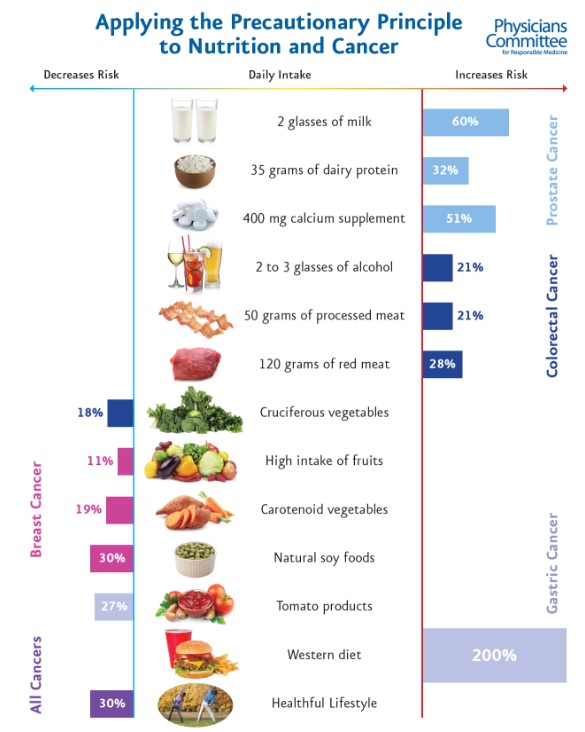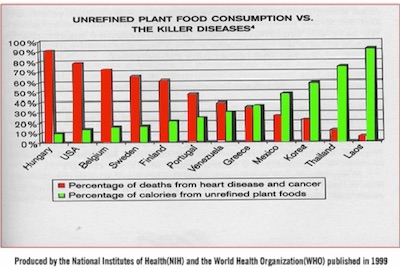Animal products (meat and dairy) promote cancer growth; plant foods prevent and can even reverse it. Regardless of your family history of cancer or other risk factors, you can significantly reduce the chance you will get it by adopting a 100% whole food, plant-based (WFPB) diet.
What is cancer?
Cancer, in which cells in your body mutate, divide and spread, goes through three stages: initiation, promotion and progression. Initiation happens when chemicals capable of causing cancer, called carcinogens, are processed by the liver, turning them from fat soluble to water soluble where they can be excreted from the body. But sometimes these chemicals escape the process and because they are highly reactive, damage molecules like DNA, RNA and protein. If the damaged DNA is not repaired by the body’s immune system, it is permanently changed, causing a mutation. Promotion is when clones of these mutated cells replicate and cluster together over the years. In the progression stage, these clusters, or pre-cancer cells, grow and become tumors. If the tumors invade other tissue or parts of the body, then the cancer has metastasized.
What causes cancer?
In addition to chemicals, there are many factors that can lead to cancer’s development at any of the 3 stages. These include certain viruses, excessive radiation (including from sunlight), nutritional imbalances, obesity, cigarette smoking, alcohol consumption, lack of physical exercise and stress.
Your genes (family history) are often implicated as a risk factor of cancer. However, according to a report published on the National Institutes of Health website, only 5-10% of cancer cases are due to family history, meaning that you are born with mutated genes. But many people suspect that it’s not your genes but how you were raised, the food you ate, the environment you grew up in, etc. that lead to certain cancers running in families. So the good news is that most cancer cases are due to environmental and lifestyle factors – things you can control.
We all have cancer cells that are initiated due to carcinogens, viruses, and lifestyle factors, but a strong immune system supported by proper nutrition can help control whether that cancer develops. Dr. T. Colin Campbell, co-author of The China Study and Whole, has stated that “nutritional imbalances are the most significant causes of cancer” and “…if we have genes that give rise to cancer, we can use nutrition to control the expression of these genes.”
The research:
Lab research conducted by Dr. Campbell showed that high doses of the animal protein casein, which is the primary protein in cow’s milk, promotes chemically induced liver cancer. Rats given a diet of 20% casein had their tumors grow, but when it was lowered to 5%, the tumors shrank. This finding is consistent with earlier research conducted by Indian scientists Madhavan TV, and Gopalan C. in “The effect of dietary protein on carcinogenesis of aflatoxin.” So it turns out that cow’s milk is a carcinogen for humans!
Other findings and experts back up these studies:
- Breast cancer is most prevalent in countries where people eat diets high in animal protein and fat (meat and dairy). Per Dr. Campbell, “plant-foods tend to decrease and animal foods tend to increase breast cancer risks.”
- Plant-based protein does not initiate or promote cancer growth. Humans only need to consume 10% of their calories from protein, which is exactly the amount you get by eating a balanced WFPB diet.
- A World Cancer Research Fund Report of 1997 reviewed 144 human studies which showed a protective effect of fruits and vegetables with total cancer. No studies have showed a protective effect of animal-based foods with cancer.
- Dr. Neal Barnard of PCRM.org states that “…regularly consuming animal protein can quadruple the risk of dying from cancer – making dietary choices just as deadly as smoking.”
- A WFPB diet can help you maintain a healthy weight. Over 121,000 cases of cancer each year are attributed to obesity.
What can you do to reduce your cancer risk?
- Adopt a 100% WFPB diet
- Be physically active at least 30 minutes per day
- Maintain a healthy body weight
- Limit supplements, with the exception of Vitamin B12 for those on a 100% WFPB diet, or as recommended by your doctor
- Limit sugary foods and drinks and salty, processed foods
- Limit or avoid alcohol
Although there are no studies proving this, there are theories that “diet-induced acidosis may influence molecular activities at the cellular level that promote carcinogenesis or tumor progression.” See our articles on how to balance your pH.
 Here’s a link to a great chart published by PCRM about the benefits and risks of certain lifestyle choices and cancer.
Here’s a link to a great chart published by PCRM about the benefits and risks of certain lifestyle choices and cancer.
In summary, regardless of your family history of cancer or other risk factors, you can significantly reduce the chance you will get it by adopting a WFPB diet. You have the power to heal from within!


Could you please explain more on why we should “limit supplements”?
You should be able to get all the nutrients you need from a whole food plant-based diet. The exception is Vitamin B12, so a supplement is necessary. Other than that, it will depend on your individual needs. For instance, you many need to supplement Vitamin D3 if your body is not manufacturing enough. Work with your medical care professional or nutritionist for your unique needs.
Love this! So true. I wish more people would realize their health is in their power despite their genetics and plant-based is the answer!